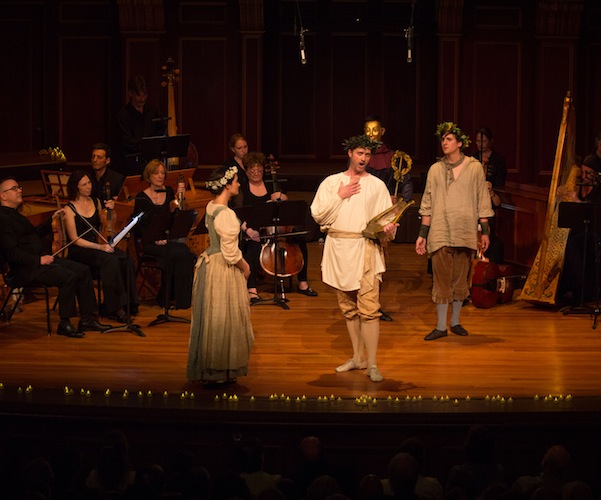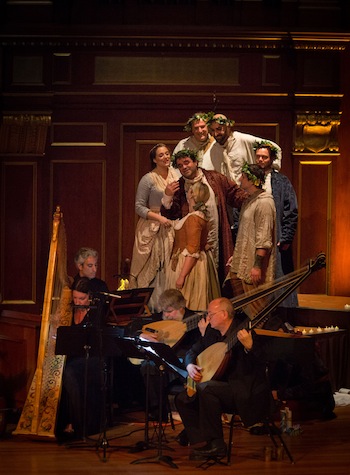Concert Review: Boston Early Music Festival — Musical Miracle Workers
After experiencing, in seven days, Monteverdi’s three extant operas and his Vespers of 1610, I am in awe of BEMF and everyone associated with it.

Mirielle Asselin (Euridice), Aaron Sheehan (Orfeo), and Nathan Medley (Shepherd) with the BEMF Chamber Ensemble in the BEMF 2015 revival of “Orfeo.” Photo: Kathy Wittman.
By Susan Miron
To have heard Monteverdi’s gorgeous Vespers of 1610 and his groundbreaking — and heartbreaking — Orfeo just a few days after hearing his operas Il Ritorno d’Ulisse in Patria (The Return of Ulysses to His Homeland) and L’incoronazione di Poppea (The Coronation of Poppea) is a distinct privilege I do not expect to be repeated in my lifetime. Boston Early Music Festival worked its stellar gathering of instrumentalists and singers to near-exhaustion — so much repertoire and so little time to prepare. Yet, collectively, cast and crew achieved electrifying heights, night after night. Everything I heard, including Benjamin Bagby and Sequentia’s Frankish Phantoms: Echoes from Carolingian Palaces (8th – 10th centuries), was, in a word, sublime. This is the kind of week that reinforces BEMF’s sterling reputation. Bravo to BEMF! And bravo to its army of hardworking volunteers!
Monteverdi’s Vespers of 1610 emerged as the hot seventeenth century choral work for several musical organizations this past year. (This is the third time its been performed in Boston in eight months.) The Boston Early Music Festival Chamber Ensemble (ten players) was joined by the Dark Horse Consort (three trombones and two cornets) and the BEMF’s vocal ensemble of ten singers. Stephen Stubbs conduced with sensitivity. Often, this work is performed — to the horror of some Early Music “experts” — with a large chorus. The truth is that only ten singers were available at the ducal church of Santa Barbara in Mantua during Monteverdi’s time, precisely the maximum number of parts specified in his Vespers collection. The terrific singers here were mostly made up of those taking a night “off” from performing the operas; they included sopranos Shannon Mercer (stepping in at the last minute for Amanda Forsythe, who was ill and still had several Poppeas left) and Teresa Wakim, mezzo Laura Pudwell, countertenor Reginald Mobley (replacing Nathan Medley), the fabulous tenors Colin Balzer (the hero of Ulisse), Jason McStoots, and Zachary Wilder (both of whom I have lavishly praised before and must do so again), baritone John Taylor Ward, and basses Marco Bussi and Christian Immler. This was an unforgettable, deeply moving performance.
—–
BEMF’s Orfeo was an encore performance of its superb 2012 production with Aaron Sheehan as Orpheus and soprano Mireille Asselin as Euridice and soprano Shannon Mercer as the messenger who tells Orfeo of Euridice’s death. Performed only once, on Saturday night at Jordan Hall, the concert was clearly the stellar event of the festival, with a long line of people trying (in vain) to find an available ticket. (It will be repeated at the Mahaiwe Performing Arts Center in Great Barrington, MA on Sunday, June 21) Musical director Stephen Stubbs also played chitarrone, a lute with a giraffe-like neck. The orchestra, having played three other large works by Monteverdi over the past week, played extra beautifully, perhaps because, at his point, Monteverdi’s music had become part of their DNA.
Monteverdi published Orfeo at own expense in 1607, hoping that the piece would be his ticket to a job in Rome. He landed a position in Mantua instead. The audience for the first performance of what is now considered by scholars to be the first opera was the elite Accademia degli Invaghiti (The Academy of the enamored), under the active patronage of the heir to the Manruan throne, Francesco Gonazga, the prince who has sponsored Orfeo. The premiere, which was complete success, took place in a narrow stage area in a small room in the ducal palace in Mantua. Orfeo was a brand new theatrical idea for its time -— a play where the actors sung all of their parts — the birth of real opera, a form which then languished until the late nineteenth century.

BEMF Vocal and Chamber Ensemble in BEMF’s 2015 revival of “Orfeo.” Photo: Kathy Wittman.
With its libretto by the supremely gifted court poet Allesandro Striggio (ca. 1573–1630), Monteverdi’s Orfeo is inspired by the classical Greek tragedy of Orfeo, the consummate singer and master of the lyre who ends up losing his beloved Euridice — twice. His troubles are triggered by what happens after he breaks a deal he made with Plutone (Marco Bussi), God of the Underworld. Significantly, Orfeo is the son of Apollo (Jason McStoots), God of the sun, of music, of right reason and unflappable balance. According to our distinguished pre-opera lecturer, Harvard University’s Thomas Forrest Kelley, Orfeo’s misery is rooted in a bedeviling conflict; he can’t decide whether to follow his heart or his head once he enters Pluto’s realm of emotional chaos. “We are Orpheus every day of our lives,” the charismatic Kelley declared.
Full of wonderful instrumental solos (especially for cornet, violin, and harp) dances, and one lovely tune after the other, BEMF’s Orfeo also featured an agile and masked Carlos Fittante, who danced as a jester, Pan (God of Shepherds), Thanatos, (God of Death), Amor (God of Love), and Harpocrates (God of Silence). Aaron Sheehan was once again outstanding as Orfeo, first as the love-crazed husband of Euridice (Mireille Asselin), then as the agonized soul who begs to descend to where no which no mortal can go to rescue her and, finally, as the first operatic character to have a mad scene. Orfeo’s irrecoverable loss is relieved by his father, Apollo, who whisks him off to heaven where he can reunite with his Euridice in the stars. This melancholic study in love lost concludes, as was the custom of the era, with an oddly happy ending, shepherds and nymphs dancing to jubilant music, as if the composer wanted to impart some joy after so many gut-wrenching happenings.
Kudos again to Baroque harpist Maxine Eilander, who played along gracefully with the two chitarrones and also performed exquisite solos during Orfeo’s heart-rending travails. (Mr. Kelley pointed out that this was the first written harp solo in Western music). A deep bow to Shannon Mercer and Teresa Wakim, who were Silvia and Proserpina in Orfeo and Ottavia and Drusilla in Poppea. They sang exquisitely together in the Vespers of 1610 as well. Wakim was particularly excellent all week long. Hats off to the violinists Robert Mealy and Julie Andreijeski. In fact, all the singers and instrumentalists did an outstanding job. After experiencing, in seven days, Monteverdi’s three extant operas and his Vespers of 1610, I am in awe of BEMF and everyone associated with it. This time around they pulled off a miracle.
Susan Miron, a harpist, has been a book reviewer for over 20 years for a large variety of literary publications and newspapers. Her fields of expertise were East and Central European, Irish, and Israeli literature. Susan covers classical music for The Arts Fuse and The Boston Musical Intelligencer. She is part of the Celtic harp and storytelling duo A Bard’s Feast with renowned storyteller Norah Dooley and, until recently, played the Celtic harp at the Cancer Center at Newton Wellesley Hospital.
Tagged: BEMF, Boston Early Music Festival, Early Music, Monteverdi, Opera, Orfeo, The Coronation of Poppea, The Return of Ulysses to His Homeland
